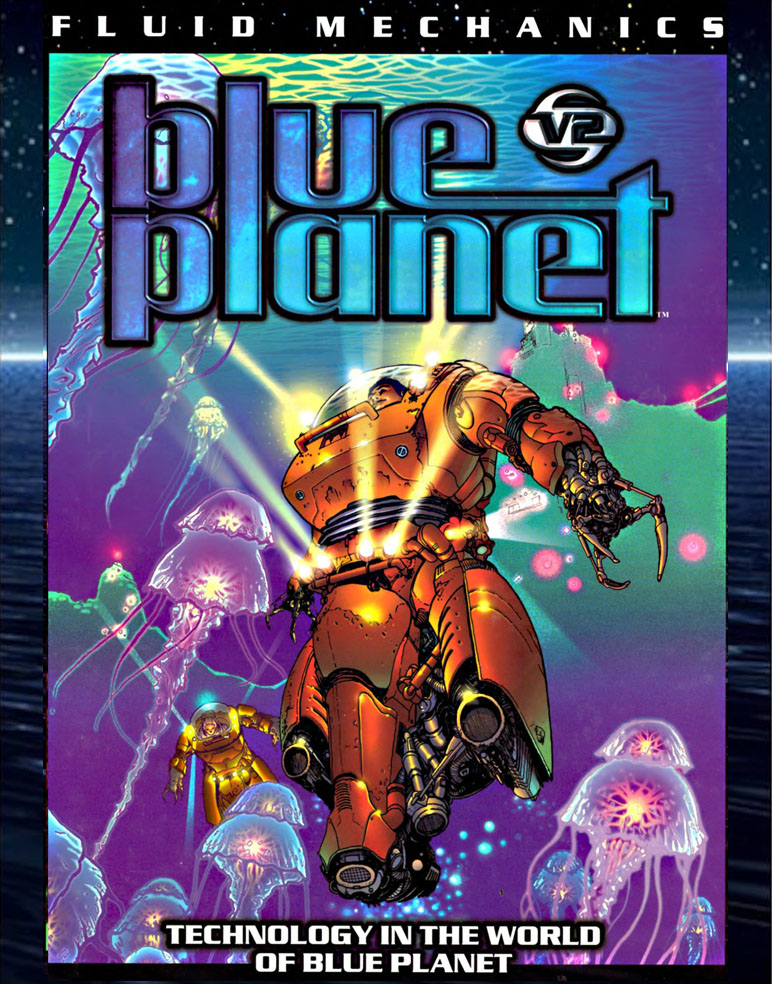Fluid Mechanics sets itself a goal and then goes and seals the deal.
Review Originally Published May 21st, 2001
I’m sure I wasn’t the only one surprised when Fantasy Flight Games started releasing hardcover supplements for their critically acclaimed Blue Planet game. Although I was initially skeptical, I now applaud them for taking the risk: The extra couple of bucks the hardcover format tags onto the cost for these supplements is more than compensated for by the durability which the hardcover offers.
The unavoidable question, of course, is whether or not the content wedged into the pages between those hard covers is worth the price tag. To start answering that question, let’s take a look at the first Blue Planet supplement: Fluid Mechanics: Technology in the World of Blue Planet.
ASSESSMENT
Arguably the first thing which distinguishes one science fiction setting from another is the technology which is available in that setting – in fact, technology can be considered the defining quality of any given science fiction world. Fluid Mechanics is designed to give Blue Planet players a wealth of technological tools, developing the hard science which provides one of the foundations for the creative depth of the Blue Planet setting.
Unlike the “techbooks” for many games, Fluid Mechanics does not limit itself to simply providing a textual warehouse of disconnected technical gadgets, instead distinguishing itself by presenting a cohesive, integrated view of the technical reality of the Blue Planet world. As a result, even if a gadget is not specifically addressed within Fluid Mechanics, the book will leave the GM with a firm sense of whether or not such a device could exist within the scope of the setting.
Another strength is the technical art which accompanies the text – illustrating the technology which is being described. I would have liked to have, perhaps, seen a bit more of it – but, when it is present, it is crisp, clear, and informative.
Given the strength of the technical art, it is surprising to note that the book’s sole true weakness lies within some of the “atmosphere” art (art which is not specifically connected to a technical description). At times, this can be extremely weak.
CONCLUSION
Fluid Mechanics sets itself a goal and then goes out and does it with great panache. If you’re running a Blue Planet campaign, then this book should definitely be on your “To Buy” list.
Style: 4
Substance: 4
Writers: Jeffrey Barber, Greg Benage, Greg Porter, Brian Schoner, Jason Werner
Publisher: Fantasy Flight Games
Price: $23.95
ISBN: 1-887911-11-1
Production Code: BP03
Page Count: 128
Reading this today, it probably seems weird to open a review by questioning the wisdom of publishing a hardcover RPG supplement. At the time, though, this was a surprisingly controversial decision. With very few exceptions, RPG supplements were simply NOT hardcover books. There were certainly exceptions, but it was completely unprecedented for an entire line of RPG products to feature hardcovers. Even D&D wasn’t doing that!
There were, in fact, people who were really angry about this. They felt that RPG publishers were somehow ripping them off by charging premium prices for hardcovers. In reality, the hardcovers were generally only a few bucks more expensive than comparable softcovers of the time, but it wasn’t unusual to see someone ranting about how they would rather pay less for a softcover book.
The reality was that RPGs were becoming unprofitable to print, but fans were, in fact, extremely resistant to publishers increasing prices. (Nothing has really changed: People, of course, never like to see prices go up, but RPGs with print runs of a few thousand copies are frequently having their cover price compared to books with print runs of tens or hundreds of thousands of copies.)
The watershed moment for hardcover RPG supplements came when John Nephew, the founder of Atlas Games, posted a detailed breakdown of the design and production budget for Ars Magica supplements on the RPGNet forums. What it boiled down to was simple: It cost a little bit more to print a hardcover book, but the perceived/actual value of the hardcover meant that gamers were willing to pay a price high enough that publishers could actually afford to CREATE the book. Therefore, all future Ars Magica supplements would be hardcover books. It wasn’t long before the rest of the industry followed Atlas’ lead.
Even Wizards of the Coast was eventually dragged along: 3rd Party OGL publishers followed the same economic logic and began publishing hardcover books while Wizards was still publishing softcover B&W books. This contributed to the 3.5 Edition reboot of the game, which also allowed Wizards to reboot the D&D supplement line in more profitable (and competitive!) hardcovers.
For an explanation of where these reviews came from and why you can no longer find them at RPGNet, click here.












